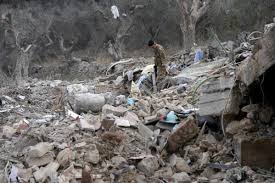
AITO, Lebanon — The day after a deadly Israeli airstrike in northern Lebanon – far from Hezbollah’s main area of influence – the militant group’s acting leader said it would aim rockets into more areas of Israel.
Naim Kassem said Hezbollah is focused on “hurting the enemy,” and he signaled it would ramp up attacks further south in Israel. He mentioned the cities of Tel Aviv and Haifa, which have already been targets of attacks.
His comments in a pre-recorded, televised speech were delivered on the same day the United States said it sent a small team of troops to Israel to support an American-made missile-defense system.
The Biden administration has also sent a warning to Israel: Increase the amount of humanitarian aid it allows into Gaza within the next 30 days or risk losing access to U.S. weapons funding.
Hezbollah has fired an estimated 13,000 rockets into Israel over the past year in support of Hamas’ war with Israel in Gaza. Tens of thousands of northern Israelis have been displaced from their homes, and Israel has said its escalating war with Hezbollah is aimed at stopping those rockets so families can return home.
Israel’s military said Hezbollah fired over 90 projectiles into Israel on Tuesday, with no details.
On Monday, an Israeli airstrike on an apartment building in northern Lebanon killed at least 22 people. Israel said it struck a target belonging to Hezbollah, but the United Nations on Tuesday called for an independent investigation.
“We have real concerns with respect to … the laws of war,” said Jeremy Laurence, a spokesperson for the U.N.’s human rights office in Geneva. Laurence said the U.N. had received credible reports that a dozen women and children were among the dead.
In the village of Aito, in Lebanon’s Christian heartland, rescue workers on Tuesday found more bodies and remains in the rubble, including the body of a child.
Aito is far from Hezbollah’s main areas of influence in Lebanon’s south and east. The strike was a shock to residents, and it exacerbated fears that Israel would expand its offensive deeper into Lebanon.
“I heard a loud noise, like a boom,” said Dany Alwan, who lives next door. “We ran outside, I saw the dust and the smoke and the rubble. There was a body here, another one there. It was a really ugly and painful scene.”
The three-story building had been rented out to the Hijazi family, who fled their home in the southern village of Aitaroun, according to Elie Alwan, Dany Alwan’s brother and the building’s owner.
Some 1.2 million people have fled southern and eastern Lebanon, where the fighting between Israel and Hezbollah has been concentrated.
Several villages in southern Lebanon and the Bekaa Valley saw intensified airstrikes Tuesday. The state-run National News Agency said an Israeli airstrike on Qana in Tyre province killed at least one person and wounded 30. And the Lebanese Health Ministry said a strike on Riyak in the Bekaa Valley killed five people, including three children.
Hezbollah began targeting Israel with rockets on Oct. 8, 2023, a day after the Hamas attack on Israel that left 1,200 dead and 250 as hostages in Gaza.
Israel’s ensuing war against Hamas has left more than 42,000 people dead in Gaza, according to local health officials. They do not differentiate between fighters and civilians, but have said a little over half the dead are women and children.
Hezbollah has said it will continue to target Israel until a cease-fire in Gaza is reached.
“We cannot separate Lebanon from Palestine, or Palestine from the world,” said Kassem, who has led Hezbollah since Sept. 27, when its longtime leader, Hassan Nasrallah, was assassinated in an Israeli airstrike.
Over the past year, 2,350 people in Lebanon have been killed in Israeli airstrikes, according to the country’s Health Ministry, which says roughly 25% have been women and children.
Meanwhile, Pentagon press secretary Maj. Gen. Pat Ryder announced that U.S. troops had arrived in Israel a day earlier. The team will operate a Terminal High-Altitude Area Defense battery to defend against ballistic missile attacks from Iran, which supports both Hezbollah and Hamas and has launched two missile attacks on Israel this year.
“Over the coming days, additional U.S. military personnel and THAAD battery components will continue to arrive in Israel,” Ryder said.
Iran has warned U.S. troops would be in harm’s way if they launch another attack.




